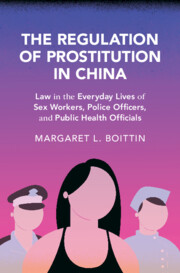 The Regulation of Prostitution in China
The Regulation of Prostitution in China from Part III - The State
Published online by Cambridge University Press: 05 December 2024
This chapter is about the local health officials who implement China’s surveillance and behavioral outreach health policies for estimating the prevalence of HIV/AIDS and reducing its occurrence among sex workers. These policies set out clear guidelines for targeting certain types and numbers of sex workers for HIV/AIDS testing and outreach, with the goal of obtaining accurate knowledge of the overall sex worker population and reaching out to the individuals who present the greatest concerns to public health. These policies are also designed to protect the individual rights of sex workers, a prerequisite for obtaining higher quality data and increasing the likelihood that public health interventions will yield safer sexual behaviors. Yet frontline health workers often deviate from these rules, as obstacles within China’s health bureaucracy complicate proper policy implementation. Local health officials must also contend with two powerful entities that are predisposed to oppose their work: the sex industry and the police. Taken together, these challenges lead health agents to focus their testing and outreach efforts on hostesses instead of low-tier sex workers – even though women in the low tier are most in need of health interventions – and result in other irregularities in policy implementation with grave public health consequences.
To save this book to your Kindle, first ensure [email protected] is added to your Approved Personal Document E-mail List under your Personal Document Settings on the Manage Your Content and Devices page of your Amazon account. Then enter the ‘name’ part of your Kindle email address below. Find out more about saving to your Kindle.
Note you can select to save to either the @free.kindle.com or @kindle.com variations. ‘@free.kindle.com’ emails are free but can only be saved to your device when it is connected to wi-fi. ‘@kindle.com’ emails can be delivered even when you are not connected to wi-fi, but note that service fees apply.
Find out more about the Kindle Personal Document Service.
To save content items to your account, please confirm that you agree to abide by our usage policies. If this is the first time you use this feature, you will be asked to authorise Cambridge Core to connect with your account. Find out more about saving content to Dropbox.
To save content items to your account, please confirm that you agree to abide by our usage policies. If this is the first time you use this feature, you will be asked to authorise Cambridge Core to connect with your account. Find out more about saving content to Google Drive.